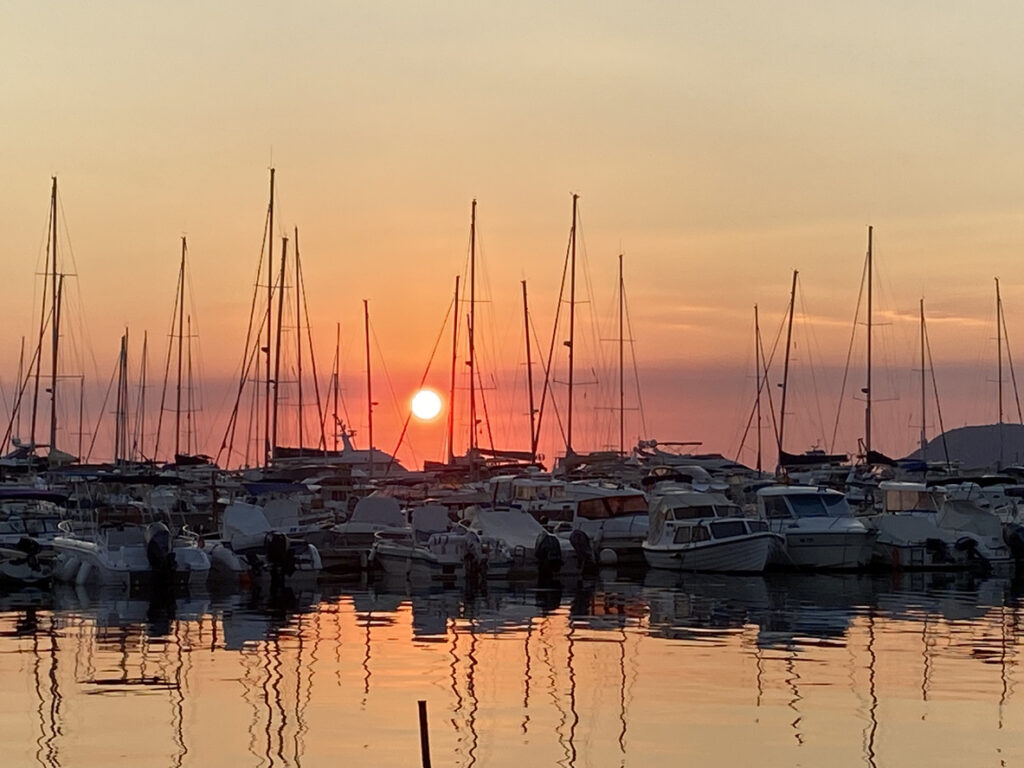This post was written by NCTE member R. Joseph Rodríguez.
The thing about [the tree] in A Tree Grows in Brooklyn was that it could grow anywhere. And keep growing. And that was the metaphor [emphasis in original]: that even when things got really hard for everyone in that story [. . .] the tree kept growing. The main character, her name was Francie—she was like that tree. Ms. Laverne said that all of us—Esteban, Tiago, Holly, Amari, Ashton and even me—we’re that tree too. (2)
—Jacqueline Woodson, from Harbor Me
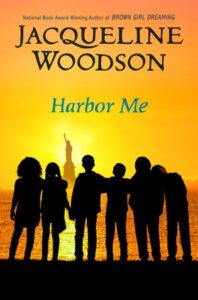 These words from the young people’s novel Harbor Me are like a balm through the massacre at Annie Robb Elementary School, although what heals griefs can change from day to day. Teachers who experience loss understand this as we work with students and their families over the years. We carry the memories of our students’ lives and the lives of our colleagues, too, in the caring work that we do. The students reappear with their questions that are part of adolescence and in the characters they meet as we read and study classic and contemporary literature together.
These words from the young people’s novel Harbor Me are like a balm through the massacre at Annie Robb Elementary School, although what heals griefs can change from day to day. Teachers who experience loss understand this as we work with students and their families over the years. We carry the memories of our students’ lives and the lives of our colleagues, too, in the caring work that we do. The students reappear with their questions that are part of adolescence and in the characters they meet as we read and study classic and contemporary literature together.
The students and preservice teachers with whom I work turn to literature often to connect and understand what is happening in their lives and as we name our worlds together and anew. Every turn of the page—in digital and nondigital format—or a narrative poem provides a path to meaning, or even guides us to more questions to consider in the harbor of our classrooms.
What can we learn and understand about the massacre of fourth graders and their two teachers on May 24, 2022, in Uvalde, Texas? I believe that we must remember the names of the students and teachers whose lives were lost in the harbor of their school. We can remember them now and in the decades to come. The teachers, parents, caregivers, and relatives know their children’s names, their given and preferred names. Each of us say and hear their names similar to a chorus before their funeral, in the whispers of their lives, and in the memorials to come.
Family members and friends speak of the Robb Elementary School students and teachers and also share digital stories, photographs, and videos that document their everyday lives at birthdays and also their engagement in storytelling, games, and local sports. We hear of the students who wrote their names boldly on their school notebooks, storage cubbies, and worn backpacks. To forget or erase their names just means we tread on their lives even further.
A school can be the bedrock of civilization much like a library or museum. As a teacher of adolescents, I believe in creating a caring, safe, and welcoming environment for students, so they can experience deeper learning, civic engagement, and critical thinking. Such environments are numerous and appear in Aurora, Newtown, and Parkland, among other places where violence and massacres have occurred.
Students want to write about what’s on their minds, what brings them worry or wonder, and what tugs at the heart and mind as young people who are coming of age. On May 25, 2022, I invited my students to write freely about what was on their minds and what they wished adults knew or understood better. I wrote beside them.
Jovany was one of the first to share. He noted, “The students were in school, mister. In school! I come to school fearless like anybody should.” (All students’ names are pseudonyms.)
Isabella typed in her eJournal notebook, “This is not right for several reasons starting with guns used to harm innocent people in school where we’re supposed to be the safest.” After reading her digital journal entry, I reflected on the word harbor, all its meanings across events, tragedies, and time.
Remember Them and Their Names
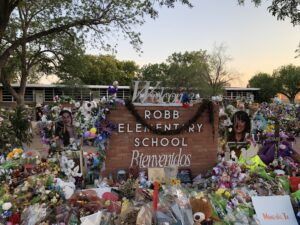
When harm is done to a student and that harm is by another child or teen or an adult, teachers stand up. That is our SOS, a distress signal, and call to stand up. The school children, teachers, and staff at Annie Robb Elementary were experiencing a unique day of celebration and ceremony on May 24, 2022. There were many milestones to celebrate in the lives of the students and their teachers and families.
In Uvalde, above the school’s name on a red brick wall is the word Welcome, while the Spanish word Bienvenidos appears below the school’s name, opening arms to a bilingual community. Indeed, a school is a place of community, learning, and refuge as many families know and come to understand as residents of this region and beyond (Texas Public Radio).
Just a month earlier my husband and I had driven through Uvalde on our way home from visiting family in Eagle Pass, Texas, and Piedras Negras, Coahuila, México. A banner above the main highway announced the annual children’s event named El día de los niños of Uvalde: Celebrating Young Readers at the Uvalde County Fairplex, April 26, 2022. As we drove on, we noted that if a town celebrates and honors youth, then Uvaldeans value young people, a population with whom we work and from whom we learn as educators.
Certainly, we must remember the children’s names and also the names of the adults who cared for and learned with the children before their deaths at Robb Elementary School. To forget is another moment of amnesia as we erase reality and walk away irresponsibly. Throughout the country, many leaders and journalists began to learn how to pronounce the names of the children and teachers as we pronounce them in this region (Gomez Sarmiento).
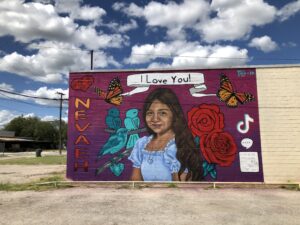
Credit: Photo courtesy of e.E. Charlton-Trujillo. Used with permission.
And a child’s name must remain at the tip of our tongues and also the names and work of teachers whose hidden armor we witness through shattering assaults and moments like these (Dey et al).
Here are their names: Nevaeh Alyssa Bravo (age 10), Jacklyn Cazares (9), Makenna Lee Elrod (10), Jose Manuel Flores Jr. (10), Eliahna “Ellie” Amyah Garcia (9), Uziyah Garcia (10), Amerie Jo Garza (10), Xavier Lopez (10), Jayce Carmelo Luevanos (10), Tess Marie Mata (10), Maranda Mathis (11), Alithia Ramirez (10), Annabell Guadalupe Rodriguez (10), Maite Yuleana Rodriguez (10), Alexandria “Lexi” Aniyah Rubio (10), Layla Salazar (11), Jailah Nicole Silguero (10), Eliahna A. Torres (10), and Rojelio Fernandez Torres (10).
These are their teachers’ names: Irma Garcia (48) and Eva Mireles (44).
Difference Makers
In early June I saw a photo of a child named Rojelio Torres who did not survive (Kens 5). Rojelio smirks into the camera lens as he wears a maroon t-shirt that reads “difference MAKER Robb Elementary.” His father Federico Torres searched for him and then waited patiently outside the school doors for news and updates (Mayer). Each of us can be the difference MAKER for Rojelio and the children and teachers whose lives ended in a school community filled with care, learning, and love (KSAT).
Yes, we can be the difference MAKERS! Let us remember our students’ names and lives by standing up in their memory. The time is now for the people to rally together and for our students to be represented, protected, and safer in our schools and communities. Their names can make a difference. Our students’ names are a way of bonding with them and honoring who they are and are becoming through our attentiveness, care, knowledge, and professionalism. Their ideas and imagination grow as they come to understand themselves and their presence among others in the greater world.
Like many students, teachers, and school staff across the country, my students and I are subjected to drills each month or so to be ready if someone attempts to harm us at our school campus. We lock doors, turn off lights, count off quietly, close curtains, force silence, and await shots or all-clear. We become numb to these forms of disruptive schooling and enforced trauma on our students and lives; we seem to acquiesce without question or policy change at the shooter’s whim.
To What Harbor?
We must lead for change to harbor and protect our students, teacher colleagues, staff, and families. Now is the time for the “good trouble” the late US Representative John Lewis advocated for to make a better country for our youth and families. Many examples of trouble for public good and braver, safer spaces surround us daily—inside and outside of school. For instance, Martha Carreon, a children’s librarian at El Progreso Memorial Library in Uvalde, kept the local public library open after the tragedy for young readers and thinkers to enter as “[a] refuge. A safe place. An escape,” (Hixenbaugh). Even today young people continue to find a place for storytelling, literature, and their imagination.
My students encouraged me to write a poem, while others wrote lyrics and music inspired by the children, teachers, and families of Robb Elementary School. Several students played a song by the Yakima Valley artist Yahritza Martinez and viewed it on TikTok. Some reflected on the repetition found in Deborah Paredez’s poem titled “Uvalde Shooting Highlights Role of Doors in Security Plans.”
Here’s my poem, which my students suggested that I share with more readers:
intaglio
in honor of the students and staff
Annie Robb Elementary School
Uvalde, Texas
children believe
adults to stand up
for their worlds
of bubbles and joy
burbujas y alegrías . . .
children remind
adults they want
safe and brave
worlds now
¡Qué valentía!
children know
who’s at their side
for warmth
and care daily
cariños . . .
children tell
adults to stand up
for their engraved
lives and learning
just this morning
las mañanitas . . .
May 28, 2022
We have learned so much in less than a year about human difficulties, failures, griefs, and safety (Farrer and Vargas).
We are still learning about becoming a difference MAKER like Rojelio was as we create braver and safer environments in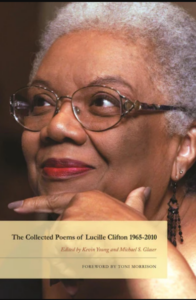 schools and our country. All children and adolescents want to learn beside their classmates, and they seek a harbor in our classrooms. Even the 1982 US Supreme Court case Plyler v. Doe reminds us that all children need access to learning as some states challenge school funding (McGee), and safer laws for our communities and schools must come next.
schools and our country. All children and adolescents want to learn beside their classmates, and they seek a harbor in our classrooms. Even the 1982 US Supreme Court case Plyler v. Doe reminds us that all children need access to learning as some states challenge school funding (McGee), and safer laws for our communities and schools must come next.
In the poem “if something should happen” by Lucille Clifton, the reader experiences the conditionals of a situation. The poem begins, “for instance / if the sea should break” (55) for us to ponder possibilities. As we read on toward the end of the poem, however, a question appears: “in a rush of breaking / where will the captains run and / to what harbor?” (55).
Our care, love, and understanding for our students begin with our open doors to our classrooms, which still remain harbors for them to learn and grow as they reach understanding and meaning beside us.
 R. Joseph Rodríguez teaches high school reading and language arts and is also a teacher educator in Austin and Fredericksburg, Texas. He is the author of several publications on adolescent learning and literacy education and, most recently, his poems appear in Where Stars Meet People: Teaching and Writing Poetry in Conversation, coedited by Leilya A. Pitre (Rowman & Littlefield). Joseph serves as coeditor of English Journal, a publication of the National Council of Teachers of English. Follow him via Instagram and Twitter at @escribescribe or via email at escribescribe@gmail.com.
R. Joseph Rodríguez teaches high school reading and language arts and is also a teacher educator in Austin and Fredericksburg, Texas. He is the author of several publications on adolescent learning and literacy education and, most recently, his poems appear in Where Stars Meet People: Teaching and Writing Poetry in Conversation, coedited by Leilya A. Pitre (Rowman & Littlefield). Joseph serves as coeditor of English Journal, a publication of the National Council of Teachers of English. Follow him via Instagram and Twitter at @escribescribe or via email at escribescribe@gmail.com.
Works Cited
Dey, Sneha, et al. “21 Lives Lost: Uvalde Victims Were a Cross-Section of a Small, Mostly Latino Town in South Texas.” Texas Tribune. 27 May 2022, www.texastribune.org/2022/05/25/uvalde-school-shooting-victims.
Clifton, Lucille. The Collected Poems of Lucille Clifton 1965–2010, edited by Kevin Young and Michael S. Glaser, BOA Editions, Ltd., 2012.
Farrer, Martin, and Ramon Antonio Vargas. “Texas Shooting: School in Uvalde Where 21 Were Killed Will Be Demolished, Says Mayor.” The Guardian, 22 June 2022, www.theguardian.com/us-news/2022/jun/22/texas-school-shooting-uvalde-robb-elementary-to-be-demolished.
Gomez Sarmiento, Isabella. “How We Pronounce Uvalde Says a Lot about the Power of Language in Mixed Communities.” NPR, 3 June 2022, www.npr.org/2022/06/03/1102860709/uvalde-pronunciation.
Hixenbaugh, Mike. “Uvalde Librarian Thought about Canceling Storytime. Instead, She Made It a Refuge.” NBC News, 25 May 2022, www.nbcnews.com/news/us-news/uvalde-texas-shooting-library-storytime-rcna30512.
Kens 5. “Families Gather to Say Goodbye to Two More Robb Elementary Students.” YouTube, 4 June 2022, www.youtube.com/watch?v=-gnl_l0la4Q.
KSAT. “‘He Loved Everybody’: Rojelio Torres, 10, Remembered for Being Kind and Loving Video Games.” KSAT12 News, 2 Aug. 2022, www.ksat.com/news/local/2022/08/02/he-loved-everybody-rojelio-torres-10-remembered-for-being-kind-and-loving-video-games/.
LaLagirl1433 [@lalagirl1433]. “Praying for Uvalde #restinpeace.” TikTok, 27 May 2022, www.tiktok.com/@lalagirl1433/video/7102065920197086507.
Mayer, Chloe. “Uvalde School Parent Prays for Missing Son in Heartbreaking Video.” Newsweek, 25 May 2022, www.newsweek.com/father-prays-son-missing-uvalde-school-shooting-texas-1710028.
McGee, Kate. “Gov. Greg Abbott Says Federal Government Should Cover Cost of Educating Undocumented Students in Texas Public Schools.” Texas Tribune, 5 May 2022, https://www.texastribune.org/2022/05/05/greg-abbott-plyler-doe-education/.
Moreno-Lozano, Luz. “Color del Dolor: 21 Uvalde Murals of Robb Elementary Victims Use Paint to Heal Pain.” Austin-American Statesman, 25 Oct. 2022, https://www.statesman.com/in-depth/news/2022/10/25/healing-uvalde-21-murals-memorialize-tell-story-robb-elementary-victims/69520352007/.
Paredez, Deborah. “Uvalde Shooting Highlights Role of Doors in Security Plans.” poets.org, 2022. https://poets.org/poem/uvalde-shooting-highlights-role-doors-security-plans
Rodriguez, R. Joseph. “intaglio.” Where Stars Meet People: Teaching and Writing Poetry in Conversation, edited by Leilya A. Pitre, 2023, pp. 64-65.
Texas Public Radio. “Uvalde Considers How Namesake of Robb Elementary Should Be Remembered after the School Is Torn Down.” Texas Public Radio, 2 Aug. 2022, www.texasstandard.org/stories/uvalde-tx-robb-elementary-school-namesake-annie-robb.
Woodson, Jacqueline. Harbor Me. Nancy Paulsen Books, 2020.
It is the policy of NCTE in all publications, including the Literacy & NCTE blog, to provide a forum for the open discussion of ideas concerning the content and the teaching of English and the language arts. Publicity accorded to any particular point of view does not imply endorsement by the Executive Committee, the Board of Directors, the staff, or the membership at large, except in announcements of policy, where such endorsement is clearly specified.

